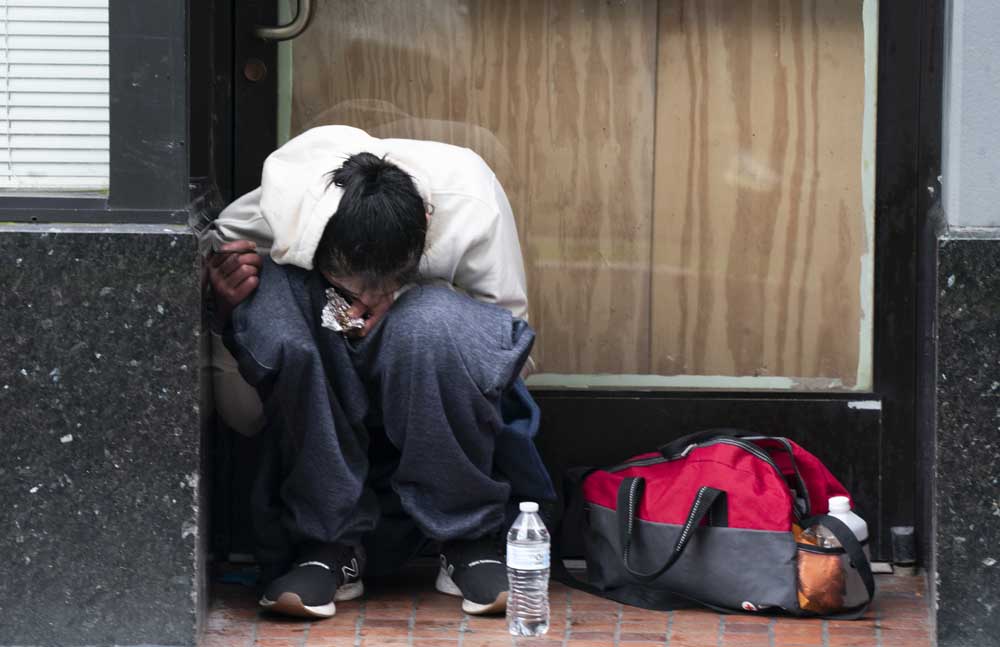Deschutes County drug deflection program shows ‘early success’
Published 5:45 am Friday, November 29, 2024

- A person smokes fentanyl on April 12, 2023, in downtown Portland. A report released this week shows more people using multiple illegal drugs at the same time, such as fentanyl and methamphetamine.
Since September, when the state rolled back its voter-approved drug decriminalization law, Measure 110, there have been 34 people in Deschutes County eligible for the county’s new deflection program, which was established in the wake of Measure 110 to give those arrested for drug possession a chance to receive treatment rather than criminal charges.
Of those, 23 people entered the program, and Capt. Neil Marchington, who leads the program through the Deschutes County Sheriff’s Office, said he’s optimistic about the program’s early success.
Trending
The deflection program was the state’s compromise to recriminalizing drug possession while still abiding by the spirit of the original decriminalization effort. The program gives those accused of drug possession 60 days to enter and complete addiction treatment. If they complete that treatment, prosecutors won’t file criminal charges.
The system, like Measure 110 itself, was envisioned as a way to keep low-level drug offenders out of the revolving door of jail and the court system, and into addiction treatment. But whereas Measure 110 was criticized for failing to have enough teeth to push people into treatment, deflection programs being set up across Oregon after Measure 110’s widely acknowledged failure have an accountability measure baked in: Get treatment or you could go to jail.
Marchington said that of the 135 drug-related arrests in Deschutes County since September, 35 people were eligible for the program. Several of those who were eligible never entered the program because the offenders weren’t interested in treatment; of the 23 people who did engage in the deflection program, five have successfully completed it and 10 more are on track for success, Marchington said. Each person who enters the deflection program has individually tailored treatment goals, and to succeed must pass a treatment evaluation within those 60 days.
Six people have failed the program, and there are two more who will likely not complete it, Marchington said, but he is still encouraged by these numbers, especially because it has only been a few weeks since the earliest participants were eligible to graduate the program.
“To have a rate where we’re on track for somewhere around 50-60% success rate, that’s pretty phenomenal,” Marchington said. I think in some degree, it’s better than I was anticipating, partially because of the types of folks we are serving. You know, we’re serving folks involved with fentanyl and with methamphetamine, and those substances are really compelling to the folks that are struggling with addiction.”
In 2023, 1,416 people died of fentanyl overdoes in Oregon, up from 280 in 2019, according to the Oregon Health Authority. In Deschutes County, fentanyl and methamphetamine accounted for more than 60% of overdose deaths between 2021 and 2023. After four people died of fentanyl overdoses in the first week of the year, the Deschutes County Commission declared a temporary state of emergency.
Trending
Deschutes County District Attorney Steve Gunnels agreed with Marchington that the county’s deflection program shows early success.
“The program is going well, so far. We have a good initial success rate, and we’re learning how to make the program better as we go. Much of the credit goes to the sheriff’s office and to the treatment providers for getting this program off the ground in such a short time,” Gunnels said.
But the impacts of the deflection program are greater than simply getting people sober and avoiding drug charges, Marchington said. The program has had positive effects beyond what law enforcement was originally anticipating, particularly due to the dedicated work of the program’s peer support specialists.
“They’re helping folks make resumes, get jobs, get birth certificates,” Marchington said. “Early on, what I see so far, is I see people who were homeless, who are not homeless. I see people who had no jobs, who have jobs. I see people who have hope of getting their kids back. Folks feel like they have somebody in their corner for the first time in a long time.”








